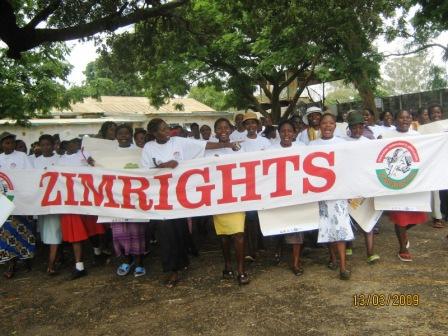
[ad_1]
ZIMBABWE Human Rights Association (ZimRights) joins the rest of the world in commemorating the International Day of Peace which was established in 1981 by the United Nations General Assembly. In 2001, the General Assembly unanimously voted to designate the day as a period of non-violence and ceasefire.
This year’s commemorations that are running under the theme Recovering Better for an Equitable and Sustainable World, speak well to the Zimbabwean situation.
ZimRights believes that as we heal from the COVID-19 pandemic, displacements and many other crises we are facing as a nation, we can collectively recover better and build a peaceful nation.
ZimRights calls on government to put in place enablers to ensure nation building, formulate policies and programmes that restore stability and ensure sustainable peace which can be achieved when we create a culture of human rights.
Through the ZimRights right to peace campaign, we have continuously capacitated and strengthened Zimbabwean communities through new infrastructure for peace and strengthening existing peace cultures.
The ZimRights rights to peace campaign builds on three fundamental beliefs which are:
The understanding of peace as a right
- Chamisa under fire over US$120K donation
- Mavhunga puts DeMbare into Chibuku quarterfinals
- Pension funds bet on Cabora Bassa oilfields
- Councils defy govt fire tender directive
Keep Reading
- Activating community tools and cultures of peace
- Linking the national peace architecture with community structures.
- When we understand that peace is a fundamental human right whose foundation is in the Bill of Rights, we will embrace the consequent obligation to build it. We believe that the first pillars in the journey to build sustainable peace is respecting humanrights.
ZimRights, therefore, calls on the government to participate in the peace-building journey by respecting the rights of the people of Zimbabwe as enshrined in the Bill of Rights.
During the course of the year, we have documented serious violations of human rights that are an affront to our constitutional obligation to work for peace and justice for all.
The displacement of communities from their ancestral and agricultural lands to pave way for big businesses that are owned by friends and families of the ruling elite.
- The overthrowing of the National Peace and Reconciliation Commission (NPRC) from discharging its mandate regarding the Gukurahundi atrocities as well as deploying political activists to damage the NPRC’s reputation.
- The suspension of elections as an avenue through which ordinary people directly influence how they are governed. The massive looting of public funds and natural resources by politically exposed persons depriving the poor of their right to education, healthcare, clean water and a safe environment.
These few, among many, make a mockery of the peace tenets enshrined in our Constitution.
As we commemorate the International Day of Peace, ZimRights calls on the government of Zimbabwe to do the following:
- Stop the displacement of people from their homes as this is a violation of their dignity and their right to shelter.
- Stop the systematic attacks on the integrity and mandate of the NPRC and provide the necessary resources for the commission to do its work.
- Repeal Statutory Instrument 225A of 2020 and allow by-elections to resume in the areas affected by the illegal recalls.
- Investigate allegations of grand corruption and prosecute perpetrators.
ZimRights further calls upon the NPRC as the commission charged with advancing the national goals on peace and reconciliation to adhere to its constitutional mandate, maintain its independence and regain the confidence of the people of Zimbabwe.
The NPRC must distance itself from political activists that are bent on destroying its credibility.
ZimRights offers its solidarity to all the Zimbabwean communities that have not known peace in a long time, encouraging them to remain vigilant in the pursuit of peace. –ZimRights information department
Opportunistic politicians must be voted out
IF one walks the streets, they will ask themselves will there ever be change or they need to reconsider where their vote will be.
Well, the truth is, it doesn’t even matter. The routine is the same, one year before the elections, the electorate will receive guests from all political parties set to contest in the elections.
That guest will come with gifts in the form of food, fertilizer or even drill a number of boreholes so that the electorate will vote for them.
But has the voter taken time to check the menu? Has the voter taken time to take stock of what was promised and what was delivered in the previous election?
Well I have, they all say and I quote, ”vote for me if you want to see change”. I have been hearing this line since I was a young girl and some of you can even see it through.
After this line, you vote and wish the best for the candidate, only to see them disappear into thin air along with their promises.
Politics has become a business for many people and is now being used not to help communities, but to line politicians’ pockets.
Apparently, it is only up there where the country is divided because in the communities, we are always playing our part by placing our trust in the leadership and only hoping that it does not abuse us more. Electoral candidates always make us feel betrayed after we vote for them.
Zimbabweans deserve a little bit of change. Ahead of the 2023 harmonised elections, we need candidates who promote growth and development regardless of the party they are aligned to.
We need candidates who are capable of fulfilling their promises and supporting the general vision. –Kaunda
Partisan security forces are Zim’s biggest election risk
ARE partisan security forces Zimbabwe’s biggest election risk? This key democratic question is extensively interrogated by Crisis in Zimbabwe Coalition.
The pertinence of this question and how security forces are at the centre of shadow States is further probed in The Shadow State in Africa,’ Democracy in Africa’s latest publication.
Security forces and politics
Section 208(2) of the Zimbabwean Constitution provides that security services must not be partisan or further any political party interests.
To this end, what is envisaged are neutral non-affiliated security services. But available evidence seems to suggest otherwise.
According to Crisis in Zimbabwe Coalition, the country has a “highly partisan and extremely politicised” security force which has seen the ruling party openly benefiting from its political patronage. Further, this military factor has contributed to impunity and a dearth of the rule of law.
Similarly, Democracy in Africa highlights how the capture of democratic political systems by private power networks, also known as shadow States, threatens human rights. It also shows how these networks of unelected political fixers and civil servants wield more power than elected legislators.
In such instances, real power ceases to vest in official institutions of government, rather, parallel government structures assume “access to the inner sanctum of power.”
Shadow States in Zimbabwe
According to the Democracy in Africa’s research, Zimbabwe has undergone three phases of shadow States and security forces were a key component at each stage.
The initial period was the covert shadow State from 1990-2000, which operated behind the scenes but was apparent from loyalists of the ruling party being appointed to key military posts, for example.
During this time, in order to consolidate power, the elite pushed for a de jure one-party State. The shadow State in crisis, which occurred between 2000 and 2008, was the second phase.
Recommendations
The involvement of security forces in shadow States has a negative impact on the holding of free, fair and credible elections. To this end, Crisis in Zimbabwe Coalition recommends urgent security sector reform to ensure that the sector stays away from civilian and political affairs.
Additionally, the setting up of the Independent Complaints Mechanism set out in section 210 of the Constitution which facilitates investigation into the misconduct of security forces is emphasised. –Crisis in Zimbabwe Coalition
[ad_2] Source link










